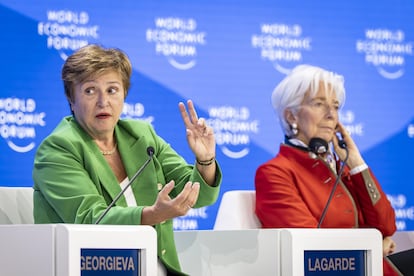The world braces for Trump’s economic revolution
Major global players are devising their strategies in response to the protectionism policies promised by the Trump presidency


The world economy is entering the second quarter of the 21st century with clear signs of a paradigm shift, largely influenced by Republican Donald Trump’s return to the White House. His victory marks a renewed push for economic nationalism, driven by tariff wars, and also signals potential upheavals in the energy sector, with plans to boost fossil fuel production. This shift extends to other areas — such as finance and technology — through deregulation. The annual Davos forum sought to decode the early indicators of a path that seems increasingly turbulent. Everyone is preparing to minimize risks and capitalize on emerging opportunities.
Trump’s economic strategies — presented by the president himself during a video conference on Thursday — were met with mixed reactions at the forum. While there was enthusiasm among business leaders regarding deregulation, there was significant concern about the proposed strategy of raising tariffs. Nonetheless, the overall mood in Davos suggested strong confidence in the future of the American economy, particularly due to the powerful synergy between the vast capital markets and the technological prowess of the world’s leading superpower. This connection was highlighted by Kristalina Georgieva, director of the IMF, during a panel on Friday.
“Why growth in the United States is so strong, why growth in Europe is somewhat underwhelming. Why the emerging markets are not doing fantastically well. And the answer is primarily in the differences in productivity growth. The U.S. is marching ahead with high productivity because capital markets allocate money to dynamic firms, because technology turns into business investment and then it grows into company fast,” Georgieva said.
The forum also sent clear signals about how other key players — from the EU to Saudi Arabia — are likely to respond to the rise of Trumponomics 2.0.
“We are in a time of great uncertainty, at the beginning of a new American administration that will have a significant geostrategic impact,” said Nadia Calviño, president of the European Investment Bank. “A new world order is taking shape, and I think it is very important for Europe to have a strong voice and continue contributing to multilateral institutions, which are the best guarantee for finding solutions that benefit all parties. We must avoid a zero-sum mindset, as historical experience shows that cooperation and unity lead to greater global benefits,” Calviño added in comments made on the sidelines of the Davos Forum.
Calviño also urged Europe to “seize the opportunity to continue deepening its strategic relations with other parts of the world.” “Europe is a global leader in trade. We’ve seen the agreement with Mercosur, and there is significant interest from countries like Mexico and Malaysia, with more to come. Naturally, we must take care of our relationship with the United States, which is strategic for both parties, but without losing sight of the need to take control of our destiny and strengthen autonomy in areas such as security and defense, energy, technology, competitiveness, etc. This week, I have seen enormous determination and political will in Europe to act together and take advantage of all opportunities.”
Ursula von der Leyen, the president of the European Commission, outlined the direction of Europe’s response in a speech on Tuesday. She said the priority was moving toward the creation of a true common capital market — a goal echoed by many, including Christine Lagarde, president of the European Central Bank, and Larry Fink, president of BlackRock. Von der Leyen also highlighted the need for reform in the energy sector, with a plan she promised to present in February, and stressed the importance of streamlining bureaucracy to foster entrepreneurship in innovative sectors.
“Sometimes companies are dealing with 27 national legislations,” she said. “We will offer instead to innovative companies to operate all across our European Union under one single set of rules. We call it the ‘28th regime’: corporate law, insolvency, labour law, taxation — one single and simple framework across our union.”
Lagarde also added that Europe must complete a genuine banking union.
But the European response goes further. As Von der Leyen pointed out, it reflects a willingness to deepen cooperation with other countries and blocs. “In the last two months, we concluded new partnerships with Switzerland, Mercosur and Mexico,” she said. “These deals were in the making for years, if not decades. So, why are they all happening today?” She answered that it is because Europe is a reliable player that abides by the rules. The implicit answer, of course, is Donald Trump’s return to power.
In response to U.S. and Chinese protectionism, the European Commission is also outlining plans to give EU companies preference in public procurement in sensitive sectors, signaling the growing influence of economic nationalism.
There was broad consensus that Europe is facing a huge challenge at this stage. However, Fink urged against over-dramatizing the situation: “There’s too much pessimism on Europe. I believe it’s probably time to be investing back into Europe,” he said.
China is also hard at work on its economic strategy to navigate the new era heralded in by Trump. Beijing is promoting stimulus measures to counter its slowing economy, including a one-billion-dollar initiative aimed at resolving the local debt problem, announced in November shortly after Trump’s victory.
The Chinese Communist Party (CCP) is working to continue its economic transition towards sectors with higher technological added value, guarantee its autonomy in strategic products, address the toxic real estate bubble, maintain a growth rate that avoids social discontent and stimulate domestic consumption to reduce, at least a little, the enormous reliance on exports. This task is extremely complex.
But it is not only the other two major economies that are adjusting to Trump’s return. The big headline in Davos was Saudi Arabia’s plans for $600 billion in investments in the U.S. Trump himself mentioned this in his speech on Thursday (adding that he would ask the Saudi prince to bump it up to a trillion), and Saudi Finance Minister Faisal Alibrahim clarified that the figure refers to a mix of public and private investments. Saudi leaders are likely seeking to capitalize on promising opportunities in the U.S. market and to win favor with the president. Trump was clear: those who want to invest and produce in the U.S. will find a golden age; the rest will face a wall of tariffs.
Alibrahim’s remarks made it clear that, despite his undeniable political strength, Trump will face significant challenges in implementing his economic policies. The Saudi leader was evasive when asked about Trump’s desire to push for a large increase in oil production to lower prices and pressure Russian President Vladimir Putin into ending the war in Ukraine — an issue Trump promised to resolve within 24 hours.
The hydrocarbon sector also remains skeptical about some of Trump’s more ambitious claims regarding a dramatic production boost. Necessary investments, of course, only make sense if prices are poised to offer profitability, and the numbers are far from as clear as Trump’s enthusiasm would suggest.
Emerging economies, for their part, are watching the return of Trump to power with deep concern, as it brings formidable risks. Chief among them is the U.S.’s withdrawal from the multilateral framework for combating climate change — a reality that particularly impacts developing nations, which can no longer count on U.S. cooperation in halting climate change, and even less, to contributing to mitigation efforts.
Moreover, the possibility that tariff measures and workforce shortages, as a result of Trump’s crackdown on illegal immigration, could lead to inflationary pressures and slow the decline in interest rates in the United States doesn’t bode well for countries with dollarized debt.
On a global scale, efforts to subject multinationals to fairer taxation, already difficult, now seem all but impossible. Trumponomics promises to lead to wide-ranging consequences.
Sign up for our weekly newsletter to get more English-language news coverage from EL PAÍS USA Edition
Tu suscripción se está usando en otro dispositivo
¿Quieres añadir otro usuario a tu suscripción?
Si continúas leyendo en este dispositivo, no se podrá leer en el otro.
FlechaTu suscripción se está usando en otro dispositivo y solo puedes acceder a EL PAÍS desde un dispositivo a la vez.
Si quieres compartir tu cuenta, cambia tu suscripción a la modalidad Premium, así podrás añadir otro usuario. Cada uno accederá con su propia cuenta de email, lo que os permitirá personalizar vuestra experiencia en EL PAÍS.
¿Tienes una suscripción de empresa? Accede aquí para contratar más cuentas.
En el caso de no saber quién está usando tu cuenta, te recomendamos cambiar tu contraseña aquí.
Si decides continuar compartiendo tu cuenta, este mensaje se mostrará en tu dispositivo y en el de la otra persona que está usando tu cuenta de forma indefinida, afectando a tu experiencia de lectura. Puedes consultar aquí los términos y condiciones de la suscripción digital.








































